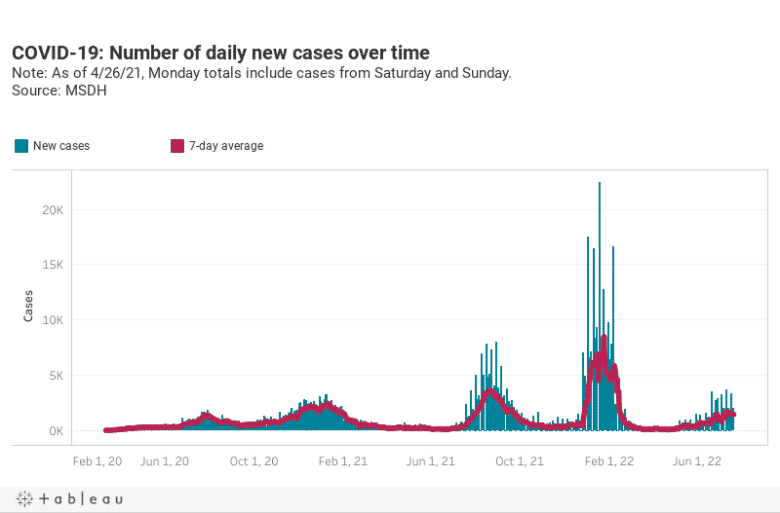
Gov. Tate Reeves explained on Thursday that his office, not the independent attorney hired to take the case, used an “objective process” to select who would face charges in the state’s massive civil lawsuit that attempts to claw back millions in misspent welfare funds.
The stated process, with its many caveats, happened to exclude University of Southern Mississippi Athletic Foundation, which the head of the welfare department and its attorney had initially intended on suing.
Reeves, who has been accused of a political cover-up in recent days for firing the private attorney bringing the lawsuit, said the state limited its complaint to people and companies who received payments that a third-party forensic auditing firm labeled as “waste, fraud and abuse” in a narrow October 2021 report or who were the subject of criminal charges.
“We’ve got to have an objective process by which we determine who gets sued. Knowing that, we can add any party in the future,” Reeves said Thursday during a press gaggle at the Neshoba County Fair — his first public comments since he was accused of firing the attorney to protect USM Athletic Foundation and other politically connected players. “… The only exception in the suit that we currently have that was not listed in that ‘waste, fraud, and abuse’ category that we have sued is Prevacus. And the reason for that is because at the time the lawsuit was filed, it was the subject of the criminal indictment from one of the co-conspirators.”
But like Prevacus, the pharmaceutical company backed by retired NFL quarterback Brett Favre, payments to the University of Southern Mississippi Athletic Foundation were also the subject of a criminal indictment and plea. The governor’s office directed the welfare department to remove the USM athletic foundation, whose board includes several Reeves donors, from its initial civil complaint before it was filed.
Reeves’ statement also doesn’t jibe with the fact that forensic auditors found $12.4 million in “waste, fraud and abuse,” but the civil suit seeks to recoup $24 million it says the defendants diverted “from the statutory purposes of that program and squandered by and for their enrichment.”
Nevertheless, the state has, at least to this point, decided against using the civil lawsuit to explore one of the most egregious schemes in the scandal: the use of $5 million in welfare money to build a volleyball stadium at the University of Southern Mississippi.
In fact, the welfare department Reeves oversees removed the attorney who crafted the case, former U.S. Attorney Brad Pigott, for doing just that. Reeves initially approved of his welfare director, Bob Anderson, hiring Pigott on a year-long contract, which ends July 31.
Another paradox in Reeves’ explanation about how they chose which people and purchases to target in the suit is that retired NFL quarterback Brett Favre wasn’t included in the forensic audit report or criminal charges, but he was named as a defendant in the civil litigation.
Asked Thursday afternoon to clarify its process for selecting defendants, the governor’s office sent a statement saying, “It was decided at the time, based on the sheer amount of evidence surrounding Prevacus that was presented in the criminal indictment, that a limited exception would be made (for those entities and individuals connected to Prevacus) to the general policy of sticking to “fraud, waste, and abuse” as identified by the forensic audit. There were many other entities that were questioned and/or included in the indictments that may be added in the future.”
The lawsuit doesn’t limit its probe into Favre to the Prevacus deal; it also includes $1.1 million in welfare money he received for public appearances officials say he never gave – an expenditure never described in the “waste, fraud and abuse” report Reeves referenced.
Favre had been seeking funding from the state of Mississippi to prop up Prevacus. Just weeks after Favre and Prevacus founder Jake Vanlandingham first offered Gov. Phil Bryant stock in the company to get him “on the team” in late 2018, they began receiving stolen welfare funds for their experimental drug projects that eventually totaled more than $2 million. Text messages uncovered by Mississippi Today showed Bryant agreed to accept a company package two days after leaving office, but arrests caused him to back out of the deal.
“We also took into account sensitivities regarding the ongoing criminal investigations that would be improper to opine upon further,” the governor’s statement continued.
Forensic auditors also noted in reports that they were limited in what they could review, preventing them from making determinations in its “waste, fraud and abuse” report about roughly $40 million in spending from nonprofit Mississippi Community Education Center, including payments to the athletic foundation and Favre.
“There are certain entities that are in question that the forensic auditor opined that they didn’t have enough information to determine if it was waste, fraud and abuse or not,” Reeves said Thursday. “And the reason they didn’t have enough information to determine that is because some entities, for example MCEC, because of the criminal case, were unwilling to cooperate with the forensic audit. So, there are a lot of entities that are not in the ‘waste, fraud and abuse’ that can be added in the future. This is the reason, by the way, that most of the time in situations such as this the civil case comes after the criminal case.”
The forensic auditors noted that they were limited in whose emails they could review and also unable to retrieve documents not just from Mississippi Community Education Center, but also from the State Auditor’s Office, which as the initial investigating agency possessed many of the pertinent documents.
Some defendants in the civil suit have requested a stay in the case to allow the criminal proceedings to wrap up before continuing the civil proceedings.
“The New Defendants have taken responsibility for their roles, yet they continue to be thrust into the crossfire by powerful forces fighting over political futures and tens of millions of dollars. The State wants to avoid liability and embarrassment, the Feds want their money back, and the public wants answers,” New’s attorney Gerry Bufkin wrote in a motion to stay on behalf of the New nonprofit Mississippi Community Education Center.
The hearing for this motion is set for August 17, and based on Reeves comments, it appears the state may be in support of this route.
Several other entities that received funds categorized as waste, fraud and abuse – such as Through the Fire Ministries, a Christian organization founded by a musician Deborah Bryant favored – were not included in the civil suit. The ministry received $25,000. The other entities named in the forensic audit report that were omitted from the lawsuit received under $25,000.
The Warren, Washington, Issaquena, Sharkey Community Action Agency (WWISCAA), a defendant in the civil suit, was sued for as little as $49,190.
Lobaki Inc., another company that criminal defendants have admitted to defrauding the government in order to lavish with hundreds of thousands of welfare dollars, is also omitted from the civil suit.
MDHS initially announced shortly after receiving the forensic audit that the agency would be suing both the athletic foundation and Lobaki – but then the governor’s office instituted its “objective process.”
When Pigott started seeking information about the volleyball scheme, the largest known purchase within the $77 million welfare scandal, the state abruptly removed him from the case.
The volleyball project began in 2017 when Favre began seeking support for a new athletic facility at his alma mater, where his daughter played volleyball. He had the ear of Bryant and welfare officials John Davis, then-director of MDHS, and Nancy New, operator of a nonprofit that had started receiving a windfall of federal grant funds from the department.
The federal government prohibits states from using this money, a block grant called Temporary Assistance for Needy Families, on brick and mortar, so officials devised a scheme to conceal the true nature of the payment by calling it a lease. The nonprofit pretended that the $5 million lease with the athletic foundation would enable it to provide services to needy people. Nancy New’s son Zach New pleaded guilty to fraud over this scheme. The deal was signed off on by Institutes of Higher Learning and the Attorney General’s Office, according to IHL board meeting minutes.
A separate report from the same forensic auditors described the $5 million payment from Mississippi Community Education Center to the USM athletic foundation as unallowed under federal rules.
To explore all involved, Pigott subpoenaed the athletic foundation for its communication with several key people, including Bryant, his wife Deborah Bryant, and Favre. At the same time, Pigott also subpoenaed conservative radio station Supertalk for its interviews with key defendants in the case who often appeared on the show to tout their work.
The administration didn’t like the direction Pigott was taking.
“There seemed to be a pattern by the lawyer that DHS originally hired to want to move beyond those that were in that (waste, fraud and abuse) category for purposes of this litigation,” Reeves said. “It was almost as if there was a political agenda from this particular lawyer.”
As for the volleyball scheme itself – which could send Zach New to prison – Reeves equivocated on the legality of the expenditure.
“…while they may not have been wise expenditures, or they may not have been expenditures that I would have approved, the question is were they legal, or were they waste, fraud, and abuse. If they were waste fraud and abuse, then we filed suit,” Reeves said. “…I don’t know all the details as to how that (volleyball stadium) came about, what I do know is that it doesn’t seem like an expense that I would personally support for TANF dollars.”
The post Gov. Reeves justifies omitting volleyball stadium from welfare lawsuit, equivocates on legality of expenditure appeared first on Mississippi Today.




















